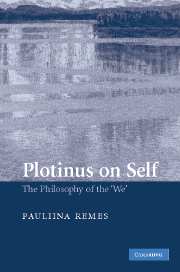Book contents
- Frontmatter
- Contents
- Acknowledgements
- Note on editions and abbreviations
- Introduction
- PART I THE ENDOWED STRUCTURES OF SELFHOOD
- PART II CONSTRUCTING THE SELF: BETWEEN THE WORLD AND THE IDEAL
- 4 Sculpting your self: self-determination, self-control and self-constitution
- 5 Action and other people: the self as a citizen of two communities
- 6 Losing the limits of the self?
- Conclusion
- Bibliography
- Index locorum
- General index
4 - Sculpting your self: self-determination, self-control and self-constitution
Published online by Cambridge University Press: 26 October 2009
- Frontmatter
- Contents
- Acknowledgements
- Note on editions and abbreviations
- Introduction
- PART I THE ENDOWED STRUCTURES OF SELFHOOD
- PART II CONSTRUCTING THE SELF: BETWEEN THE WORLD AND THE IDEAL
- 4 Sculpting your self: self-determination, self-control and self-constitution
- 5 Action and other people: the self as a citizen of two communities
- 6 Losing the limits of the self?
- Conclusion
- Bibliography
- Index locorum
- General index
Summary
Although the word ‘autonomy’ comes from Greek autonomos, literally meaning ‘living by one's own laws’, and was used in Greece both for states and persons, treatises on moral autonomy are hard to find in ancient literature. This does not, of course, mean that ancient philosophers did not have opinions on what it means to be an agent, when an action is free, or what makes an agent responsible for his actions. In fact, the connected notions of self-determination and self-sufficiency are commonly agreed upon ideals that recur in philosophical literature. Central ancient terms used in contexts relevant to what we think is covered by the issue of autonomy undoubtedly include at least enkrateia (self-control), autexousios (in one's free power, or self-determined), autarkeia (self-sufficiency), prohairesis (deliberate choice), hekousios/akousios (voluntary/involuntary) and akrasia (weakness of will). As the terminology of self-control and lack of it already shows, the ancients were inclined to worry about coercion that happens within the agent, namely the power of non-rational motivation to lead us into involuntary, or perhaps, rather, non-deliberate action. In addition to this, Platonic discussions on human freedom are closely intertwined with discussions on metaphysical necessity, and scholars have sometimes chosen to talk for instance of Plotinus' philosophy of freedom, rather than of any specifically human autonomy.
In this chapter I intend to follow two different ways of tracking Plotinus' views on what it is to be an autonomous agent and a self, both belonging to the approach where self is understood as a free or self-determining agent.
- Type
- Chapter
- Information
- Plotinus on SelfThe Philosophy of the 'We', pp. 179 - 212Publisher: Cambridge University PressPrint publication year: 2007



